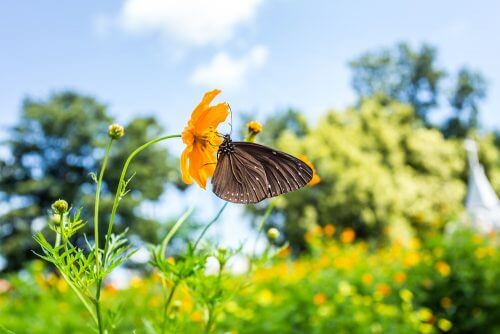Did you think that only bees are responsible for pollinating agricultural crops? You were wrong. New research reveals that other insects make a significant contribution to pollination, sometimes even more than bees
Dr. Daniel Mader, Angle - news agency for science and the environment

The popular opinion regarding the pollination of agricultural crops is that domesticated honeybees do the majority of the pollination. However, in a study by researchers from Australia, which examined the results of 39 different studies, it was found that wild insects that are not bees actually have the greatest importance in pollinating agricultural crops on a global level.
From the results of the study it became clear that flies, butterflies, wasps, moths, ants and beetles are responsible for about 40% of the agricultural pollination in the world. While these insects are not as efficient at pollination as the honey bee or wild bees, they make up for it by visiting more flowers.
It was also found that there is a difference in pollination efficiency between bees and non-bee insects in different crops - coffee and grapefruit crops were almost exclusively pollinated by bees, while mango and anona crops were exclusively pollinated by non-bee insects. It is also possible that the populations of wild insects that are not bees are more stable than bees, and therefore can compensate, at least partially, for the global decline in the number of bees in the world in recent years.
Computers re-route
This research has some very serious implications, one of which concerns the almost exclusive reliance on bees as pollinators in today's agriculture. The results could encourage the reduction of insect sprays in order not to harm this pollination potential.
It is possible that the economic assessment of honey bees as pollinators of agricultural crops will change following the publication of the new study, since today beekeepers are paid who bring beehives to fields for the benefit of pollination, and if they are not efficient enough, this has financial significance. The system services of the insects may also undergo a renewed economic evaluation - from now on it will be necessary to examine how economically profitable it is to protect wild pollinating insects, instead of ignoring them as has been done until now.
In an article we recently published, Prof. Sharon Shapir from the Faculty of Agriculture in Rehovot said that 99% of the pollination in agriculture in Israel is done by domesticated honey bees. If this is true, it may be because of the spraying and clearing of the wild areas that destroyed the other pollinating insect species near the fields, or in Israel most of the crops rely on bees. But after the publication of the new study, it may be that even in Israel there is room for rethinking the issue.

5 תגובות
It's worth reading to understand how much the sprays harm bees (and honey)
https://www.sciencedaily.com/releases/2016/03/160310111849.htm
1. The researchers are not from Australia, but from all over the world. The main researcher is from Australia and that's it.
2. "From the results of the study it became clear that flies, butterflies, wasps, moths, ants and beetles are responsible for about 40% of the agricultural pollination in the world" - this is really a distortion of the findings of the article. The paper found that non-bee insects contributed 38% of visits to the systems surveyed. Visits only, not the pollination. And from here to conclude that this is the global average, which takes into account all the crops and their relative percentages, and all the different ecosystems?
3. "It was also found that there is a difference in pollination efficiency between bees and non-bee insects in different crops - coffee and grapefruit crops were almost exclusively pollinated by bees, while mango and anona crops were exclusively pollinated by non-bee insects." – Once again, the percentage of visits does not represent the pollination or the effectiveness of the pollination! There are visits that do not contribute to pollination at all.
No
- Yes, the honey bee is harmed by spraying,
- Yes, there is spraying during flowering,
- Yes, the penetration of pesticides in honey - is possible...
I didn't understand something, if there is less pollen from wild insects following spraying, how does it not bother the bees, is there even spraying during the flowering? Is the domesticated bee more resistant to spraying? Wild animals usually adapt faster to pesticides than domestic animals and are usually more resistant (natural selection encourages more survival, while royal selection encourages other traits that usually come at the expense of something like creating an excess of honey beyond what is required or taste) One last thing, can pesticides penetrate honey?
The "new" study was published several months ago
and established an assumption that was accepted among entomologists and botanists,
The "common opinion" is only among a few farmers and beekeepers,
The trouble is that today it is known that spraying in agriculture
harm the honey bees and other pollinators,
even those that are far from sprayed places,